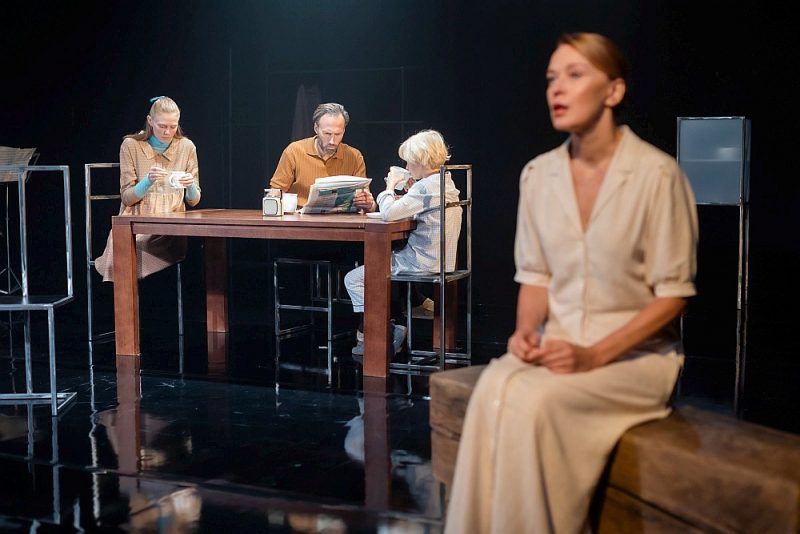
Elita Kļaviņa (from right) makes her debut as a theater director in the show, she also has one of the leading roles.
Advertising photo (Jāņas Deinat).
9:01 of 14 September 2022
–
Anda Buševica, “Kultūrzīme”, JSC “Latvijas Mediji”
–
VIDEO. Get out of here quickly! In Georgia, citizens kick Russian citizens shouting “Glory to Russia” from a bus
–
It is known when the verdict will be issued in the case of the influencer and “powder keeper” Sauliete
–
Today the stars promise great luck and auspicious moments! Horoscope for September 14th
The evening of the show “Return from afar” at the New Riga Theater is organized in an unusual way: in the first part – an opportunity to attend the homonymous comedy by contemporary French playwright Claudine Galea, in the second part the documentary film “Iļguciema’s Sisters is screened. “. It’s hard to justify such a set, it’s only held together by the personality of longtime JRT actress Elita Kļaviņa, who recently received a director’s degree. Well, perhaps the fact that both works touch on the theme of family and deep feelings, the discovery of which is useful through the mediation of art, can also be considered a link.
The film “Iļguciema māsas” premiered this spring at the “ArtDocFestRiga” festival, so the main interest is in the early part of the evening, in which Elita Kļaviņa makes her debut as a theater director, in this show she also has one of the roles main. Although in this show there are really no main roles and the story itself seems to disappear at times. “Return from afar” resembles a poem: the purpose of what is happening on the scene is to awaken feelings, associations, memories.
The text of the performance is of broken sentences, to which the sound background and the flickering of the lights give a poetic depth, which also allows us to believe that the minimalist scenography created by Ata Jákobson is able to transform itself in an instant from an unpleasant closet with a flickering light bulb in a cozy kitchen of a family home, ballroom or parking lot, where Elita Klaviņa’s mother drinks a coffee along the way without touching the croissant.
The show is about a family whose mother has passed away, but the image of the mother continues to be painfully present in the memories of family members. Everyone deals with pain differently, following an independent emotional trajectory.
Sounds, lights, texts, movements of the actors on the stage happen at the same time, creating a painting in which, contrary to expectations, the white-haired boy who hums his melody stands out, a bit poignant for his mother. Brad Brakowski is indeed a boy, so it’s hard to tell whether the show’s startling, finished image is due to the director’s work or an accidental discovery.
The second daughter of the family, a teenager, is played by actress Lolita Stūrmane. Angular female movements, introverted adolescent voice that doesn’t even pretend to be heard or address anyone. I would have liked more colors for this role: the girl is a teenager who can’t stand pain, but I would have liked to see her as an adult when she talks with her mother in her mind, because it is a dialogue between two equal women who have known each other life. .
The text repeated in a weak voice without pauses or punctuation fills the stage space without reaching me as a spectator. A successful character is the father played by Ivars Krast, a man who must keep the familiar cosmos upset due to his mother’s departure in a peaceful balance, hiding his pain.
In the show’s painting, the white-haired boy humming his tune, a little eager for his mother, played by Brad Brakowski, stands out the most.
Advertising photo (Jāņas Deinat).
Performances that must evoke a special mood, sensual language and the rhythm of movement of the actors are very risky. At the premiere I didn’t feel the expected charm, maybe there was a lack of passion, cohesion, the distance between the characters seemed strange. Only in the last scene of the show is the solution offered to the viewer, which makes it clear that perhaps everything seen before should have been perceived not as reality and real history, but as what is happening in the mother’s imagination, which they then also justify. the uncertainty of the half-awake dream and the distance between the characters on stage.
It is difficult for me to judge whether the show “I come from afar” would be able to live an independent life, because the post-break offer literally explodes the aesthetic and nuanced atmosphere evoked by the first part. The plot of the film “The Sisters of Iļguciem” can be told in a few words: the comedy “Three Sisters” is staged in the Iļguciem women’s prison together with the actors of the JRT.
Prison inmates speak the texts of Anton Chekhov’s classic about dreams and craving in the higher grade, and feminine surrender, dreamy tenderness, traces of suffering break through their hardened faces.
They also tell their life stories – episode after episode, moment after moment – and what is told by far overcomes the rural boredom of Chekhov’s three sisters. Listening to these stories is difficult, but the film is full of episodes that restore meaning and trust in humanity.
How Sister Olga thrives when JRT actors compliment her appearance at the prison theater with a sewn dress! The film’s success technique is that these women tell their stories not to the camera, but to each other, and each moment of painful opening is followed by a brotherly embrace of comfort.
All three women chosen for the film have suffered domestic violence, I see no harm in them, their stories tell of desperate situations in which sometimes the only morally acceptable solution is crime.
In the credits of the film, the information on how long each of the “sisters” was inflicted is shocking, only one of them is currently free. The indifference of society has largely sentenced this woman to prison, now the stories told by the “Iļguciems sisters” make me, as a viewer of the film, complicit in many ways.
The only thing that binds the aesthetically refined story of the show “I’m coming back from afar” with the harsh shots of “The Sisters of Iļguciem” is the awareness that life continues even after a tragedy: a person continues to feel, loving the love that has lived or living with important people. It is a testimony that love never ends.
INVESTIGATION

Advertising photo (Jāņas Deinat).
JRT production, Klodīne Galēā, “I’m coming back from afar” and the documentary by Elita Kļaviņa “Iļguciem’s Sisters”
Director of the comedy and of the film Elita Kļaviņa, translator of the comedy Agnese Kasparova, set designer of the comedy Atis Jākobson, costume designer Jana Čivžele, movement consultant Agate Bankava.
Cast: Elita Kļaviņa, Ivars Krasts, Lolita Stūrmane, Brad Brakovskis.
Chief cameraman Baiba Kļava, director of editing Sandra Alksne, sound director Anrijs Krenbergs, composer Kārlis Auzāns.
Upcoming performances: 27, 28, 29 September.
Themes
–


